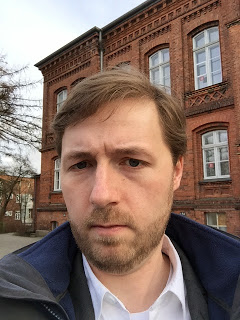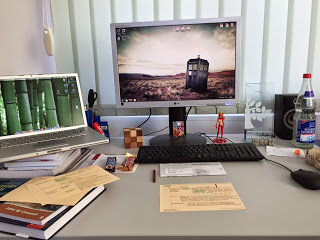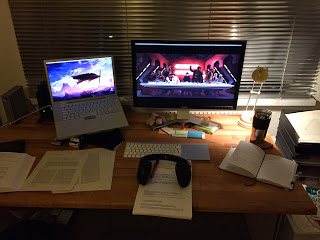I am Sebastian Zimmer and This is How I Work
 Today, I am interviewing Sebastian Zimmer for the This is How I Work series. Sebastian holds a Master’s in European Studies and is currently a Economics PhD Candidate in the “Emerging Attraction” project at European University of Flensburg. His work is concerned with approaching the influence of territorial borders on cross-border cluster formation through a communication lens. He remains in search for filters to scientific knowledge.
Today, I am interviewing Sebastian Zimmer for the This is How I Work series. Sebastian holds a Master’s in European Studies and is currently a Economics PhD Candidate in the “Emerging Attraction” project at European University of Flensburg. His work is concerned with approaching the influence of territorial borders on cross-border cluster formation through a communication lens. He remains in search for filters to scientific knowledge.
Current Job: PhD Student (Scholarship) & Lecturer
Current Location: Flensburg, Germany and Sønderborg, Denmark
Current mobile device: iPhone 6
Current computer: MacBook Pro (late 2007, and she has to last another two years)
Can you briefly explain your current situation and research to us?
Currently doing my PhD in a cross-border research group brought to life by Interreg first and now is very much kept active by the six of us. At the same time, I work as a lecturer for the Methods department at the university to keep in touch with students, the basics of research methods and close the income gap the scholarship creates in contrast to a fully paid position. My research focuses on how much influence a territorial border has on cross-border cooperation especially in the setting of an economic agglomeration (cluster). Combining the fields of Economics, Sociology, Communication Science, Informatics and Physics with a mixed method approach makes it very challenging.
What tools, apps and software are essential to your workflow?
iCal, Evernote, Dropbox, Google Drive, texstudio, Safari, Spotify, GitHub, eMail-Software, WhatsApp in a random order. Occasional fun with R excluded.
What does your workspace setup look like?
The main workspace is actually my private laptop, which is used for my Danish office once a week, and on travels (which meant 40 hours/week on a train for almost a year but that has calmed down now). My home office consists of said laptop and a large screen and lots of desk space…. and so do the other two offices where the laptop is supported by the provided PCs – clouds be thanked for a system-overarching workflow. So, yeah.. all five “locations” with the laptop.
 |
| Office |
 |
| Home |
What is your best advice for productive academic work?
Find a place where you can actually focus and if you don’t have one, create one. You may only be able to pull that off for three hours a day but if you make those count, your life will be better.
How do you keep an overview of projects and tasks?
iCal, Evernote, reminders on the phone, eMails as mind hooks and lots of sticky notes (virtually and physically). Everything has a system but only in my personal perception.
Besides phone and computer, do you use other technological tools in work and daily life?
Coffee machine. Electronic toothbrush. Oh, and various PlayStation devices. And fancy headphones to just space out.
Which skill makes you stand out as an academic?
Interdisciplinary thinking and a craftsman’s eye for methods.
What do you listen to when you work?
Randomly changing music, depending on my work speed. Classic, Rock, HipHop, Soundtracks, Random playlists.
What are you currently reading?
Reading time is forced into my schedule by simply reserving twenty minutes between going to bed and sleeping. Sci-Fi classics by Philipp K. Dick and others but as summer approaches, it will probably be replaced by non-fictional literature because of my knowledge thirst.
Are you more of an introvert or extrovert? How does this influence your working habits?
Stronger on the introvert side, thus I do like to have discussions my colleagues in the office, but I do prefer my headphone zone and get my work done in the majority of time.
What’s your sleep routine like?
Rou… what? Biologically, my body would love 3am to 11am, but reality makes it that sleep definitely happens between 4am and 7am with varying start and ending points. Bumpy?
What’s your work routine like?
Equally bumpy at the moment. Working in three different physical offices makes it a challenge to develop routines. But usually, I start to work intensively two hours after waking up for a couple hours and then in the evenings again. Night owl!
What’s the best advice you ever received?
“People assume that time is a strict progression of cause to effect, but *actually* from a non-linear, non-subjective viewpoint – it’s more like a big ball of wibbly wobbly… time-y wimey… stuff.” – Doctor Who (2007, Blink).
